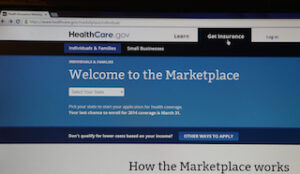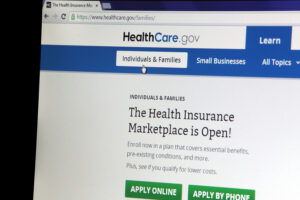About 7 of every 10 people buying coverage at eHealth during the current 2019 open enrollment period are selecting short-term plans, according to a new report from the company, up 14% from the same period a year ago.
The report, analyzing costs and trends among eHealth customers in the first half of the 2019 open enrollment period under the Affordable Care Act (ACA), was released by eHealth, Inc., on Nov. 30.
Mountain View, Calif.-based eHealth’s report focuses on costs borne by individuals and families who do not qualify for or receive federal subsidies. Following a change of federal rules allowing for the sale of short-term health insurance plans with coverage periods of up to one year, the report also examines trends among people selecting short-term health insurance plans at eHealth. The analysis covers the period between Nov. 1 and Nov. 25, 2018 and compares findings to the same period a year before. Open enrollment began Nov. 1 and is scheduled to run through Dec. 15, 2018.
Key findings:
- Increased interest in short-term plans: In the 2017 period under review, people selecting short-term plans at eHealth accounted for 56% of all combined short-term and ACA plan selections among people not receiving government subsidies for ACA plans; this figure increased to 70% for the same period in 2018.
- Short-term premiums are stable while deductibles increase: The average monthly premium for individual short-term coverage is $107 this year, a decrease of 4% over the same period a year before; meanwhile, the average individual deductible increased 14%.
- Average family premiums for ACA plans decrease 3%: The average monthly premium for family coverage among people not receiving government subsidies is $1,154, down from $1,191 in the same period a year ago.
- Average individual deductibles for ACA plans decrease 7%: The average annual deductible for individual coverage among people not receiving government subsidies is $4,064, down from $4,358 in the same period a year ago.
- Average age of an individual buying short-term coverage is 36: Up from 35 in the same period the prior year. However, the percentage of people between the ages of 18 and 34 selecting short-term plans increased from 53% in the 2017 period to 56% in the 2018 period.
eHealth’s report also examines average customer selections by plan type (HMO, PPO, etc.) and metal level. In the first half of the nationwide open enrollment period for 2019, Health Maintenance Organization (HMO) plans accounted for the majority (56%) of individual and family health insurance plans selected by unsubsidized eHealth customers. Preferred Provider Organization (PPO) plans accounted for 18%, while Exclusive Provider Organization (EPO) plans, which typically limit coverage to a specific network of providers in the same way HMO plans do, accounted for 25% of all plans selected.
The most popular metal level plan selected by individual and family eHealth customers was Bronze (39%). Silver plans were the second most popular at 36% while Gold accounted for 15% and Platinum 2%.
eHealth intends to follow up this report with additional updates on market costs and trends in the ACA market at the close of open enrollment.

1 The increased interest in short-term plans relative to ACA plans among people not receiving subsidies may be due to several factors including regulatory changes, changes in available policy duration, and the marketing choices of eHealth in the periods under review
About eHealth: eHealth, Inc. (NASDAQ: EHTH) owns eHealth.com, a leading private online health insurance exchange where individuals, families and small businesses can compare health insurance products from brand-name insurers side by side and purchase and enroll in coverage online and over the phone. eHealth offers thousands of individual, family and small business health plans underwritten by many of the nation’s leading health insurance companies. eHealth (through its subsidiaries) is licensed to sell health insurance in all 50 states and the District of Columbia. eHealth also offers educational resources, telephonic support, and online and pharmacy-based tools to help Medicare beneficiaries navigate Medicare health insurance options, choose the right plan and enroll in select plans online or over the phone through Medicare.com (www.Medicare.com), eHealthMedicare.com (www.eHealthMedicare.com), GoMedigap (www.goMedigap.com) and PlanPrescriber.com (www.PlanPrescriber.com).













Several states have restricted or totally eliminated Short Term Health plans.
Illinois gave insurers 5 hours advance notice on December 7th, that 1 Year STM's could no longer be sold. Now limited to 6 months, with a 60-day gap required between STM plans.
ACA/ObamaCare is a disaster for our industry and for millions of Americans.
I’ve been pitched some of these short term plans by telemarketers. They pitch them as major medical every time. They misrepresent the plans. They misrepresent what a PPO network is. And the poor people that buy them thinking they have health insurance coverage are screwed if they get an expensive chronic illness.
What are the telemarketers saying about PPO networks?
You will need to mystery shop them to find out. Though about doing this but have not had time. STM's are more catastrophic gap plans. Unsubsidized choose them due to pure need and lack of choice. Low prices and wider networks.
To sell present them as "true major medical health insurance" without disclosing their limitations is just irresponsible. Most seasoned agents sell them with caution and full disclosure of their limitations but the agents that get highlighted in the news are those that bypass these precautions.
Best thing is to know the laws in the states you serve and do right by the client. There is no 100% perfect plan that fits all.
Do you really believe consumers understand the caveats and will remember them when their claim is denied?
I have dodged a lot of bullets in my career but the one that caused me to take stock in what I would and would not push came early on. I was doing an employee meeting (group insurance) and taking questions. One woman asked if the plan covered maternity. I said it did and moved on to the next question.
Months later I got a call from a man who was very irate because I told his daughter the plan covered maternity. Because I neglected to mention the maternity benefit did not extend to dependent CHILDREN he was pissed when his daughter went to deliver and was told she did not have coverage.
He wanted me to pay but I declined since I was not the father.
You never want to take anything for granted and assume your client fully understands.
I don't sell STM and never will.
Completely understand your position. We all choose what products we will offer and which ones we will avoid. STM's are being used now for unintended purposes. Which I consider to be a misuse of the product and not everyone agrees with that. Many feel that unsubsidized uninsured who can't afford ACA plans only have two choices stay uninsured or pick the best of the imperfect plans that are available.
I can't say I have never sold an STM but only for it's original intended purpose to ones looking for something to cover a small gap in coverage. I get your point but as we know there are ones that offer them on the regular as something that they really are not. Some states are changing the benefits to include more protections but certain limitations will still be there.
Nothing covers 100% even ACA plans. Though we explain that to people most hear what they want to hear. Assuming that the word "Covered Benefit" means it is paid for 100% by the plan when in many cases it is covered but goes toward their deductible.
In my opinion it is the Independent Agent that needs to be the most careful since we know our clients and see them as real people and not a "What's your member number". Larger companies with anonymous agents have money and persuasion on their side. I often find I need to explain the meaning of their questionable commercial claims.
Thanks for your response
Short-term health insurance in Colorado: find affordable coverage
They say that PPO means you can go to any doctor and hospital in the country and they can not refuse you. They also say that you will pay the exact same co-pay at all doctors any you do not need to worry about networks.